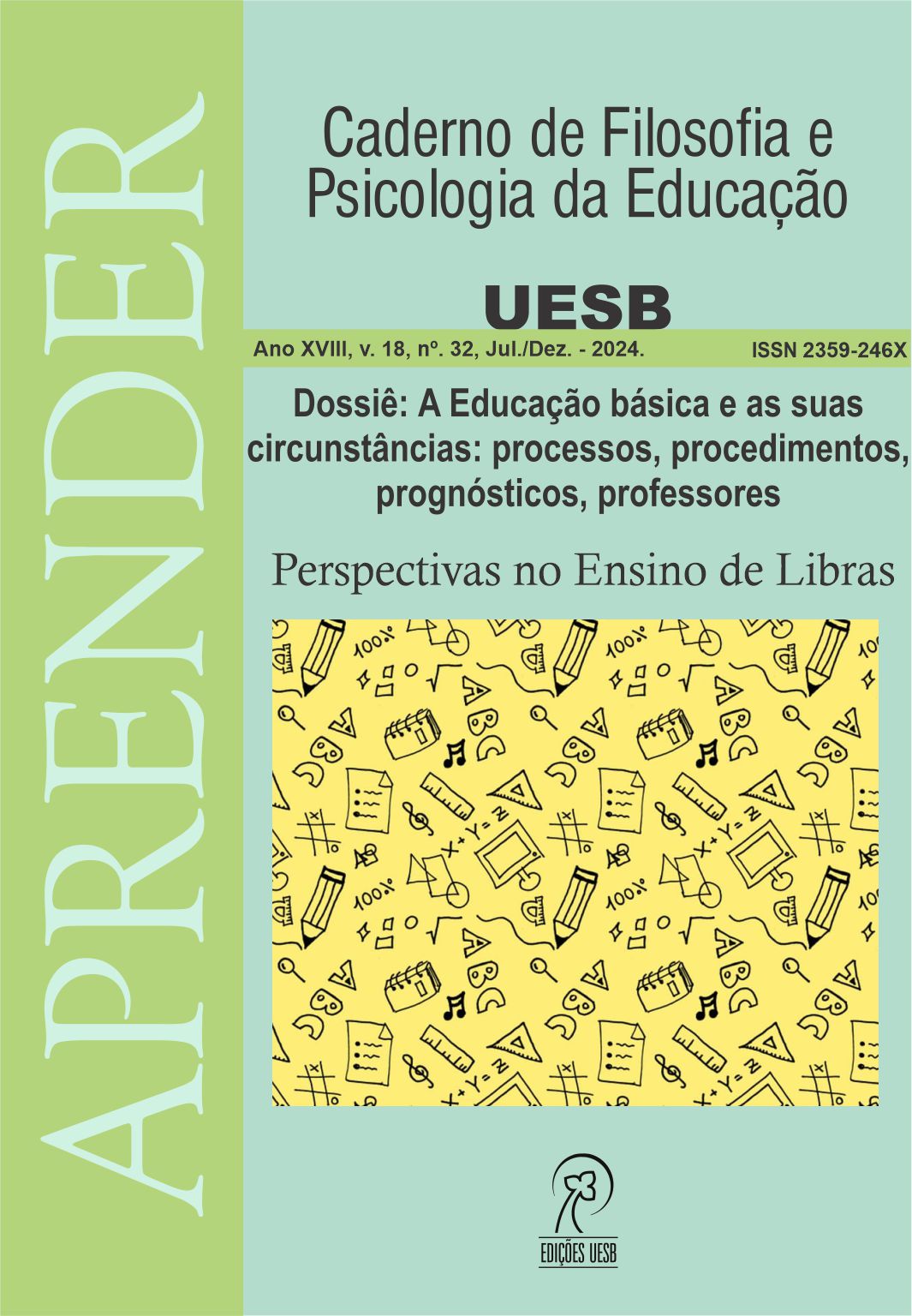A didactic sequence involving the Telegram app in pedagogical practice: the impacts from the perspective of meaningful learning
DOI:
https://doi.org/10.22481/aprender.i32.15332Keywords:
Teaching, Pedagogical Practice, Telegram, Didactic Sequence, Meaningful LearningAbstract
The research analyzed the possible impacts of applying a didactic sequence involving the Telegram application to pedagogical practice from the perspective of meaningful learning. This project was developed in the Professional Master's Degree in Professional and Technological Education (ProfEPT) in its line of research “Educational Practices in Professional and Technological Education (EPT). In this applied study with a qualitative approach, two semi-structured questionnaires were applied: one to students of the entrepreneurship discipline and the other to teachers of the Technical Course in Administration at CEDUP Guaramirim. In addition, discursive textual analysis (ATD) was chosen to analyze the data, categorizing them by content, procedures and attitudes relevant to pedagogical practice. When consolidating the data, the question was: How can the Telegram app be involved in pedagogical practice in a way that contributes to meaningful learning? In response to the inquiry, an educational product was created in the format of a didactic sequence, as an instrument that integrated prior knowledge with the pedagogical interests of students, with the challenges and teaching skills involving TDIC. The results obtained demonstrated that student participation by incorporating the Telegram app into the process of planning and applying pedagogical practice contributed to democratic, autonomous, creative and meaningful learning.
Downloads
References
APOLLINÁRIO, Fabio. Dicionário de metodologia científica: um guia para a Produção do Conhecimento científico. São Paulo: Atlas, 2004.
BATES, Tony. Educar na era digital: design, ensino e aprendizagem. São Paulo: Artesanato Educacional, 2016. (Coleção tecnologia educacional, 7).
BRASIL. [Constituição (1988)]. Constituição da República Federativa do Brasil de 1988. Brasília, DF: Presidente da República, [2016]. Disponível em: http://www.planalto.gov.br/ccivil_03/constituicao/constituicao.htm. Acesso em 02 jul. 2022.
BRASIL. Decreto Nº 5.154, de 23 de julho de 2004. Disponível em: <http://www.planalto.gov.br/ccivil_03/_ato2004-2006/2004/decreto/d5154.htm.Acesso em: 03 jul. 2022.
BRASIL. Lei Nº 9.394, de 20 de dezembro de 1996. Disponível em: http://www.planalto.gov.br/ccivil_03/leis/l9394.htm.Acesso em: 02 jul. 2022.
BRASIL. Lei Nº 11.741, de 16 de julho de 2008. Disponível em: http://www.planalto.gov.br/ccivil_03/_Ato2007-2010/2008/Lei/L11741.htm#art5. Acesso em: 01 jul. 2022.
BRASIL. Lei Nº 13.415, DE 16 de Fevereiro de 2017. Disponível em: http://www.planalto.gov.br/ccivil_03/_ato2015-2018/2017/lei/l13415.htm. Acesso em: 10 jun. 2022.
BRASIL. Ministério da Educação. Base Nacional Comum Curricular. Brasília: MEC, 2018.
BRASIL. Resolução Nº 6, 20 de Setembro de 2012.. Disponível em: https://www.gov.br/mec/pt-br/media/seb-1/pdf/leis/resolucoes_cne/rceb006_12.pdf. Acesso em 15 jul. 2022
CASTELLS, Manuel. A Galáxia da Internet: Reflexões sobre a Internet, os negócios e a sociedade. RJ: Zahar. 2001.
DEMÉTRIO, Vânio; RIBEIRO, Eduardo Augusto Werneck; PLÁCIDO, Reginaldo Leandro. Planejamento de uma Sequência Didática na Perspectiva da Formação Integrada e da Construção do Conhecimento por Constelação de Theodoro Adorno. Educação em Revista UFMG. Belo Horizonte. 2022. Disponível em: https://www.scielo.br/j/edur/a/C9cRBzqrG3T73MSGXfQFnjp/abstract/?lang=pt.Acesso em: 30 jun. 2022.
GIL, Antonio Carlos. Métodos e Técnicas de Pesquisa Social. 6. Ed. São Paulo. Editora Atlas, 2008. Disponível em: https://ayanrafael.files.wordpress.com/2011/08/gil-a-c-mc3a9todos-e-tc3a9cnicas-de-pesquisa-social.pdf. Acesso em: 06 jul. 2022.
LEITE, Cláudio Cesar de Musacchio; Práticas Pedagógicas com o uso de Mídias Sociais na Formação de Docentes em contexto Interdisciplinar. UFRGS. Porto Alegre. 2016. Disponível em:
https://lume.ufrgs.br/bitstream/handle/10183/148273/001002352.pdf?sequence=1&isAllowed=y.Acesso em: 18 jun. 2022.
LIBÂNEO, Jose Carlos. Adeus professor, adeus professora? Novas exigências educacionais e profissão docente. 13.ed – São Paulo: Cortez, 2011. – Coleção questões da nossa época; v.2.
LIBÂNEO, José Carlos. Didática. 2º. Ed. – São Paulo: Cortez, 2013.
LINS, Maria Judith Sucupira da Costa; MIRANDA, Bruna Rodrigues Cardoso. (Orgs.). AUSUBEL E BRUNER: questões sobre aprendizagem. Curitiba: CRV, 2018.
MESSENGER, Telegram. Telegram uma nova era de mensagens. Disponível em: https://telegram.org/ Acesso em 10 nov. 2022.
MOREIRA, Marco Antonio. Aprendizagem Significativa: a teoria e textos complementares. São Paulo: Editora Livraria da Física, 2011.
SERAPIONI, Mauro. Métodos qualitativos e quantitativos na pesquisa social em saúde: algumas estratégias para a integração. Rio de Janeiro. 2000. Disponível em: https://www.scielo.br/j/csc/a/8MGqFCjhjvXKQsq37t6q7PK/?format=pdf&lang=pt. Acesso em 13 fev. 2024.
THIOLLENT, M. Metodologia da pesquisa-ação. São Paulo: Cortez. 2009.
ZABALA, Antoni. A Prática Educativa: como ensinar. Trad. Ernani F. da F. Rosa - Porto Alegre: Artmed, 1998.
Downloads
Published
How to Cite
Issue
Section
License
Copyright (c) 2024 APRENDER - Caderno de Filosofia e Psicologia da Educação

This work is licensed under a Creative Commons Attribution-ShareAlike 4.0 International License.






